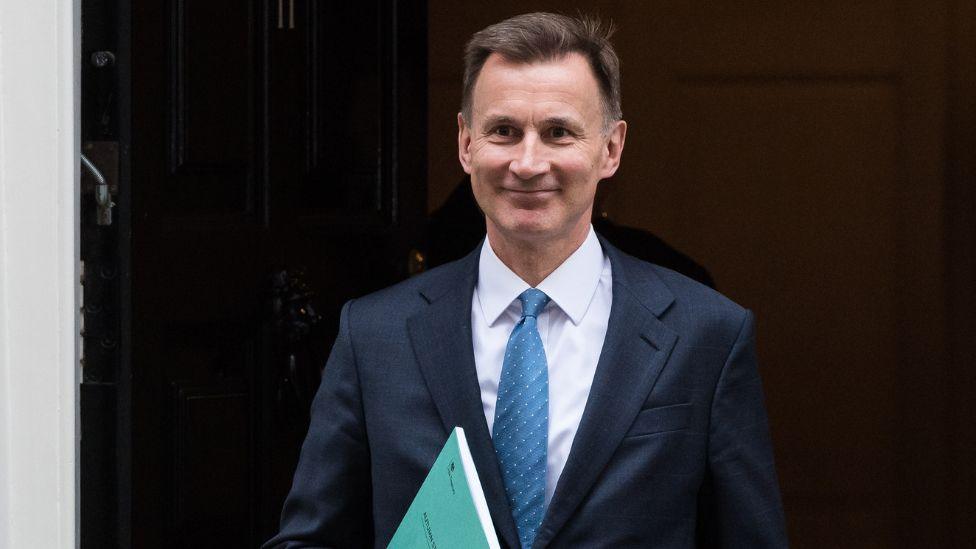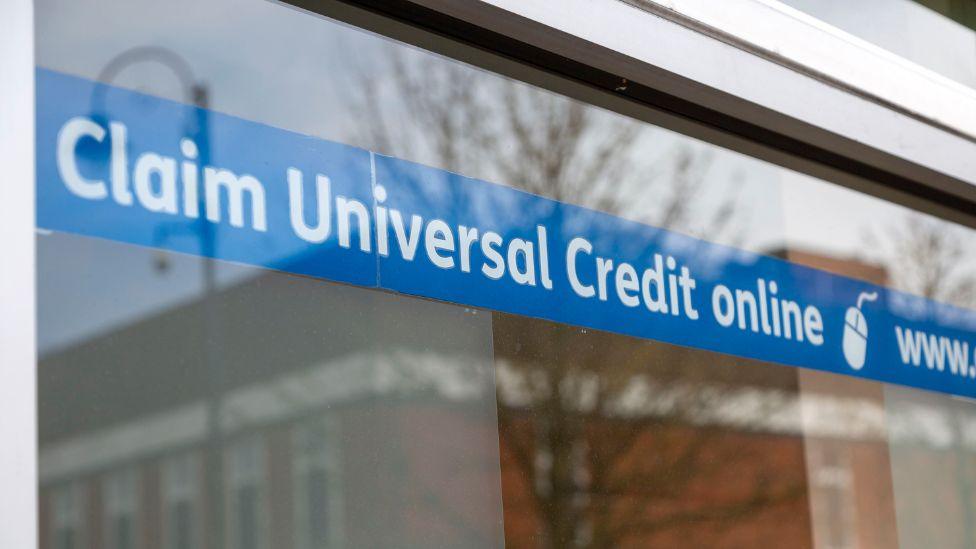How does the Autumn Statement affect Scotland?
- Published
- comments

Chancellor Jeremy Hunt announced the Autumn Statement in the House of Commons
Chancellor Jeremy Hunt has announced the UK government's Autumn Statement in the House of Commons.
From wages and pensions to benefits and business rates, the Conservative minister revealed a raft of spending pledges.
While many of the areas covered fall under areas controlled by the Scottish government, several headline policies will affect Scots.
The Treasury said the Scottish government would receive £545m in additional funding through the Barnett formula as a result of the Autumn Statement.
Scottish Finance Secretary Shona Robison, however, said the announcement made Holyrood's budget challenges even more severe.
Here are some of the key announcements from the statement.
Minimum wage
One of the crucial parts of Mr Hunt's announcement for Scots was on the National Living Wage.
The chancellor said it will rise by more than a pound to £11.44 per hour from April.
It is currently £10.42 an hour for workers over the age of 23. But Mr Hunt said the rate will now apply to 21 and 22-year-olds.
The National Minimum Wage for 18 to 20-year-olds will also increase to £8.60 an hour from £7.49.
It is a criminal offence for employers to not pay someone the National Minimum Wage or National Living Wage.
There is also a separate Real Living Wage, calculated annually by the Resolution Foundation to meet the cost of living challenges faced by workers, which is set at £12 an hour.
The UK government has estimated, external that changes to the two minimum rates affect about 200,000 workers in Scotland.
However, according to the Office for National Statistics, 91% of employees aged 18 and over in Scotland already earned at least the Real Living Wage last year. That was compared to 87.5% in England, 88.2% in Wales and 85.4% in Northern Ireland.
Benefits and pensions
While some areas of welfare are devolved to the Scottish Parliament, many of the chancellor's announcements on benefits and pensions affected Scots.
Mr Hunt said Universal Credit - a UK-wide benefit reserved to the UK government - would increase by 6.7%, in line with September's inflation figure, ending speculation the government could have used the cheaper October figure.
The chancellor also confirmed the triple-lock formula for state pension rises would be implemented as usual, meaning the state pension will rise by 8.5% in line with average earnings, worth up to £900 more a year.
But he confirmed plans for a tougher welfare regime. Benefit claimants who fail to find work for more than 18 months must go on work experience placement or face losing access to welfare, Mr Hunt said. This announcement was met with the cry of "nasty party" from the SNP benches in the House of Commons.
Stricter penalties will also apply to long-term unemployed people who the government decide are not adequately looking for jobs.

Some disability benefits are devolved, meaning the Scottish government decides how to increase them.
The main UK benefits for people with disabilities in the UK are employment and support allowance (ESA), personal independence payment (PIP), the disability living allowance (DLA) and the attendance allowance (AA).
The Scottish government took responsibility for several of these in 2020 and is in the process of transferring their management from the Department for Work and Pensions to Social Security Scotland.
North of the border, the Child Disability Payment is replacing the DLA for children, the Adult Disability Payment is replacing the DLA and PIP and the Pension Age Disability Payment will replace AA.
Meanwhile, the Local Housing Allowance, external, which provides benefit entitlement for tenants renting private-sector accommodation in England, Scotland and Wales, is to be increased.
Mr Hunt said it would rise to the 30th percentile of local market rents, which he says will give 1.6m households an average of £800 of support next year.
National Insurance
Scottish workers will be affected by the cut to National Insurance (NI), a fixed percentage deducted from the wages of UK workers.
Currently, for employees on between £12,570 and £50,268, the NI rate is 12% on earnings and 2% on profits above that.
Employees under pension age who earn less than £12,570 a year are exempt, as are people over the state pension age.
But Mr Hunt announced the flat NI rate would be cut from 12% to 10%.
He said he hoped to introduce it via emergency legislation from January 6. MPs were told someone on the average salary of £35,000 will save over £450 a year.
The chancellor also said he would abolish the "Class 2" NI charges for self-employed people. That will get rid of a flat rate compulsory charge of £3.45 a week.
Meanwhile, self-employed people who pay "Class 4" NI at 9% would see that cut by one percentage point to 8% from April.
He said the measures would save about two million self-employed people an average of £350 a year.
Mr Hunt did not announce any changes to NI and income tax bands, nor VAT.
Income tax in Scotland is set by Holyrood ministers.
Business support
Mr Hunt said the government would make a tax break known as "full expensing" permanent for firms, including those in Scotland. It had been due to expire in 2026.
The policy allows companies to offset investment in machinery and equipment against their tax bills.
The chancellor also announced a freeze in the way business rates, or non-domestic rates, are calculated for an extra year.

The Scottish government sets its own business rates - a form of property tax, administered by councils, which helps to pay for local services.
Holyrood ministers have been under pressure to follow Westminster and freeze the rates, which are typically calculated using the consumer price index.
The Scottish government has said that any decision on non-domestic rates for 2024-25 would be made as part of its budget, which will be announced on 19 December.
Ms Robison said ahead of the Autumn Statement that the Scottish government would have to make £680 million in savings next year.
Whisky
The chancellor's announcements were also being watched closely by leaders in one of Scotland's major industries - whisky.
It had been speculated that Mr Hunt would increase the tax applied to Scotch whisky to 15%. Instead, it is to remain at 10.1%, with all alcohol duty frozen.
"As well as confirming our Brexit pubs guarantee, which means duty on a pint is always lower than in the shops, I have decided to freeze all alcohol duty until 1 August next year," the chancellor said.

Alcohol duty is a tax charged at the point of production or importation of drinks of alcoholic strength exceeding 1.2% alcohol by volume. There are different rates for beers, ciders, wines, spirits, and other fermented products.
Typically, drinks with higher alcohol content are taxed at a higher rate. VAT is also charged on the duty-inclusive price.
A freeze in spirit duty from 2017 was ended in this year's Spring Budget, resulting in a 10.1% increase coming into effect in August. The Scotch Whisky Association (SWA) described this as a "hammer blow" for distillers and consumers and said it meant 73% of the price of the average-priced bottle was claimed in tax.
According to the SWA, £6.2bn worth of whisky was exported last year, external. It said this accounted for 77% of Scottish food and drink exports and 25% of all UK food and drink exports.
SWA chief executive Mark Kent said the chancellor's announcement provided much "much-needed certainty".
He added: "Despite today's duty freeze, cider is still taxed four times less than a spirit like Scotch whisky - this is not fair and cannot be justified."
Related topics
- Published22 November 2023

- Published22 November 2023
